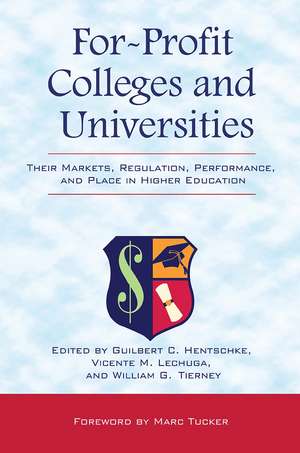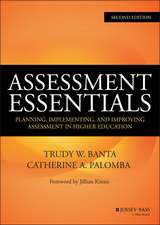For-Profit Colleges and Universities: Their Markets, Regulation, Performance, and Place in Higher Education
Editat de Guilbert C. Hentschke, Vicente M. Lechuga, William G. Tierneyen Limba Engleză Paperback – 20 ian 2010
Preț: 259.80 lei
Nou
Puncte Express: 390
Preț estimativ în valută:
49.71€ • 54.22$ • 41.92£
49.71€ • 54.22$ • 41.92£
Carte tipărită la comandă
Livrare economică 24 aprilie-08 mai
Preluare comenzi: 021 569.72.76
Specificații
ISBN-13: 9781579224257
ISBN-10: 1579224253
Pagini: 220
Dimensiuni: 152 x 229 x 20 mm
Greutate: 0.34 kg
Ediția:New.
Editura: Taylor & Francis
Colecția Routledge
Locul publicării:Oxford, United Kingdom
ISBN-10: 1579224253
Pagini: 220
Dimensiuni: 152 x 229 x 20 mm
Greutate: 0.34 kg
Ediția:New.
Editura: Taylor & Francis
Colecția Routledge
Locul publicării:Oxford, United Kingdom
Public țintă
PostgraduateCuprins
Foreword Marc Tucker 1. For-Profit Colleges and Universities in a Knowledge Economy—Guilbert C. Hentschke, Vicente M. Lechuga, & William G. Tierney 2. Evolving Markets of For-profit Higher Education—Guilbert C. Hentschke 3. Who are they? And what do they do?—Vicente M. Lechuga 4. Differences in Academic Work at Traditional and For-Profit Postsecondary Institutions. Policy Implications for Academic Freedom—William G. Tierney & Vicente M. Lechuga 5. Markets, Regulation, and Performance in Higher Education—Mark L. Pelesh 6. Accreditation and Accountability. The Role of For-Profit Education and National Accrediting Agencies—Elise Scanlon and Michale S. McComis 7. A Global Perspective on For-Profit Higher Education—Kevin Kinser 8. The Public Good in a Changing Economy—William G. Tierney Appendix A Appendix B Appendix C Contributors Index
Notă biografică
Guilbert C. Hentschke is the Richard T. Cooper and Mary Catherine Cooper Chair in Public School Administration at the University of Southern California’s Rossier School of Education.
Vicente M. Lechuga is Assistant Professor of Higher Education Administration at Texas A&M University.
William G. Tierney is University Professor and Wilbur-Kieffer Professor of Higher Education and Director of the Center for Higher Education Policy Analysis at the University of Southern California, Los Angeles. He has conducted research on colleges and universities for twenty years, the results of which have appeared in numerous journal articles, book chapters and books. His most recent book is Trust and the Public Good: Examining the Cultural Conditions of Academic Work.
Marc Tucker is President & Chief Executive Officer, the National Center on Education and the Economy, and Co-Chairman, New Commission on the Skills of the American Workforce
Vicente M. Lechuga is Assistant Professor of Higher Education Administration at Texas A&M University.
William G. Tierney is University Professor and Wilbur-Kieffer Professor of Higher Education and Director of the Center for Higher Education Policy Analysis at the University of Southern California, Los Angeles. He has conducted research on colleges and universities for twenty years, the results of which have appeared in numerous journal articles, book chapters and books. His most recent book is Trust and the Public Good: Examining the Cultural Conditions of Academic Work.
Marc Tucker is President & Chief Executive Officer, the National Center on Education and the Economy, and Co-Chairman, New Commission on the Skills of the American Workforce
Recenzii
“Until now, much about this growing sector of higher education—its student consumers, its faculty and faculty governance, market forces, hiring records, workforce preparation roles, policies and considerations of the public good—remained hidden or obscure. This work draws together both on-site research and widely disparate resources to give us a much richer and more detailed picture of the for-profit market and the students it serves. It also makes clear, however, the potential student groups traditional colleges and universities cannot, or will not, serve, or has not served well in the past.”
Yvonna S. Lincoln, Ruth Harrington Chair of Educational Administration & Distinguished Professor of Higher Education, Dept. of Educational Admin. & Human Resource Development
Texas A&M
”The authors and editors shed dispassionate light on one of the least understood, yet vital, sectors in American higher education—market funded colleges and universities. Given the growing imperative to increase dramatically the education levels of all Americans – not just those for whom college is ‘bred in the bone’ – this is a must read for what it says both about this vibrant arena, but also the implications for the rest of post-secondary education.”
Harris N. Miller, President and CEO
Career College Association
“For-profit higher education is exploding in the U.S. and across the globe. This has produced a torrent of rhetorical claims from advocates and opponents, little of which is based in evidence. At last, a fair minded and comprehensive examination of this phenomenon by a team of top thinkers and researchers. This book is a jewel, must reading for policy makers, practitioners and scholars of higher education, whether in the for-profit or not-for-profit sectors.”
Arthur Levine, President, Woodrow Wilson National Fellowship Foundation, and President Emeritus
Teachers College
“What matters more, the fact that some institutions are making a profit and others are operated in the public interest, or the fact that the for profits may be doing a better job for the most vulnerable than the not-for-profits? As I see it, it shouldn’t matter at all. If that is true, then we may have to figure out how to give the for-profits some of the breaks that the not-for-profits have always gotten.
But you may disagree. That is the fine thing about this book. It is very fair-minded. You will find plenty of data to make or counter the position you held when you first picked it up. And you will find plenty of analysis to make you think twice about that position, or perhaps to confirm it."
Marc Tucker
from the Foreword
Yvonna S. Lincoln, Ruth Harrington Chair of Educational Administration & Distinguished Professor of Higher Education, Dept. of Educational Admin. & Human Resource Development
Texas A&M
”The authors and editors shed dispassionate light on one of the least understood, yet vital, sectors in American higher education—market funded colleges and universities. Given the growing imperative to increase dramatically the education levels of all Americans – not just those for whom college is ‘bred in the bone’ – this is a must read for what it says both about this vibrant arena, but also the implications for the rest of post-secondary education.”
Harris N. Miller, President and CEO
Career College Association
“For-profit higher education is exploding in the U.S. and across the globe. This has produced a torrent of rhetorical claims from advocates and opponents, little of which is based in evidence. At last, a fair minded and comprehensive examination of this phenomenon by a team of top thinkers and researchers. This book is a jewel, must reading for policy makers, practitioners and scholars of higher education, whether in the for-profit or not-for-profit sectors.”
Arthur Levine, President, Woodrow Wilson National Fellowship Foundation, and President Emeritus
Teachers College
“What matters more, the fact that some institutions are making a profit and others are operated in the public interest, or the fact that the for profits may be doing a better job for the most vulnerable than the not-for-profits? As I see it, it shouldn’t matter at all. If that is true, then we may have to figure out how to give the for-profits some of the breaks that the not-for-profits have always gotten.
But you may disagree. That is the fine thing about this book. It is very fair-minded. You will find plenty of data to make or counter the position you held when you first picked it up. And you will find plenty of analysis to make you think twice about that position, or perhaps to confirm it."
Marc Tucker
from the Foreword
Descriere
This book offers a clear-eyed and balanced analysis of for-profit colleges and universities, reviewing their history, business strategies, and management practices; setting them in the context of marketplace conditions, the framework of public policy and government regulations; and viewing them in the light of the public good.















